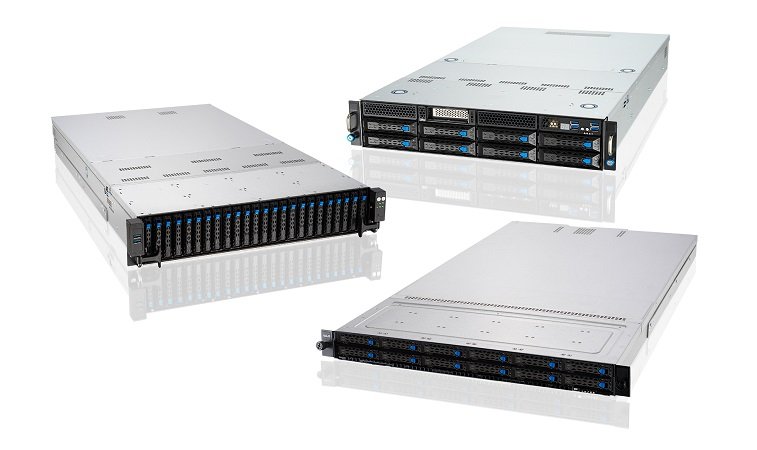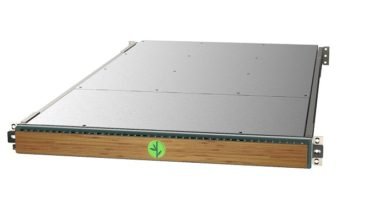ASUS announced the introduction of a comprehensive server portfolio based on the latest AMD EPYC 7003 series processors featuring both dual-socket and single-socket servers in 4U, 2U and 1U chassis with new architecture, chassis and modular design to improve system flexibility and scalability.  They also deliver support for the latest PCI Express (PCIe) 4.0, OCP 3.0 and BMC technologies to drive leading performance and improved TCO with better server performance.
They also deliver support for the latest PCI Express (PCIe) 4.0, OCP 3.0 and BMC technologies to drive leading performance and improved TCO with better server performance.
The new ASUS RS720A, RS700A, RS520A and RS500A-E11 series servers offer refreshed designs based on both dual-socket and single-socket AMD EPYC 7003 series processors. ASUS will also offer BIOS updates to enable servers based on previous-generation EPYC 7002 processors, including ESC4000A-E10, RS620SA-E10-RS12 and RS500A-E10 series, to leverage all the features of this new generation, ensuring improved and consistent performance, as well as compatibility with the latest AMD platforms.
This new range will be bolstered by forthcoming ASUS ESC series GPU servers in 4U chassis to support up to eight NVIDIA GPUs or Xilinx FPGA accelerator cards in a single system, and optimized for AI, deep learning and HPC workloads. A complete list of all ASUS server products is available at: https://www.asus.com/Commercial-Servers-Workstations.
Enhanced server and infrastructure security will be implemented in these new series by integrating PFR FPGA as the platform Root-of-Trust solution for firmware resiliency, plus regular firmware threat detection guard against and recover from security attacks.
The latest AMD EPYC 7003 series processors aim to offer incredible performance and continue to raise the bar for the modern data centers. Based on the Zen 3 core architecture, the latest AMD EPYC processors help businesses deliver better time to results, expected to provide up to double-digit generational performance gains. EPYC 7003 series CPUs can help companies maximize the benefit from their software investment and provide attractive ROI benefits for data centers.
The latest ASUS servers introduce a new modular design to enable the easy scale-up of configurations to meet increasing data-center workloads. For example, the design of the onboard LAN module design allows the default rear-panel LAN port to be replaced with either up to four 1 Gb or two 10 Gb LAN ports, and one rear-panel PCIe 4.0 slot can be switched for an OCP 3.0 module – enabling data center-grade transfer speeds of up to 200 GB/s.
ASUS servers based on the new AMD EPYC 7003 series processors feature scalable storage solutions to support maximum performance for data-center flexibility, and enable industry-standard SAS/SATA/NVMe interfacing through Broadcom Tri-Mode RAID adapters for increased connectivity and security. Flexible NVMe drives on the front panel enable extensive storage and high-throughput performance, with more storage placements on middle and rear panels available for further capacity expansion.
With this generation, ASUS is also introducing the new ASUS ASMB10-iKVM server-management solution to support the latest AMD platforms.
ASUS RS720A-E11 series servers are high-performance dual-socket 2U servers support for up to 32 DIMMs, four dual-slot GPUs, 24 NVMe drives, nine PCIe 4.0 slots and two M.2 all in one system, and ideal for HPC, AI training and data analytics.
ASUS RS700A-E11 series servers are also high-performance dual-socket servers, yet in a compact 1U chassis with up to 32 DIMMs, one dual-slot GPU, 12 NVMe drives and three PCIe 4.0 slots. They’re designed for HCI, cloud and virtualization environments.
ASUS RS520A-E11 series servers are mainstream, 2U single-socket systems with remarkable performance, including two dual-socket GPUs supports, 24 NVMe drives and seven PCIe 4.0 slots. They’re a great good choice for enterprise and data centers.
Finally, for edge servers or SMB applications, ASUS RS500A-E11 series servers feature a single-socket CPU with support for 16 DIMMs, 12 NVMe drives and four PCIe slots.



